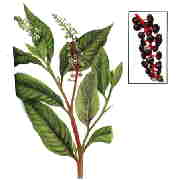
Known As: Inkberry, Pigeonberry, Pokeberry, Pokeroot, Pokeweed
Latin Name: Phytolaccaceae decandra, Phytolacca americana
Description: Small flowers with no petals that hang in grapelike
clusters. Fleshy berries at maturity. Grows up to 10 feet tall
with purple stems and alternate, lance-shaped, shiny leaves with smooth,
curled edges.
Poisonous Parts: All parts, especially roots and seeds.
Root produces cathartic poison phytolaccin. Saponin toxins especially
phytolaccigenin. Low toxicity.
Symptoms: Vomiting and diarrhea. Gastrointestinal irritation
(colic, diarrhea which may be bloody). Rarely: anemia, possibly death.
Birth defects and tumors may also be possible. Signs usually resolve within
a day or two. Veterinary literature does not document
the mutagenic and teratogenic properties of pokeweed that can induce mutations
(and possibly cancer) and birth defects.
Treatment: Unless your cat is unconscious or having convulsions,
induce vomiting and follow procedures to delay
absorption and speed elimination. Get prompt veterinary assistance.
Signs should lessen in 24 hours.
